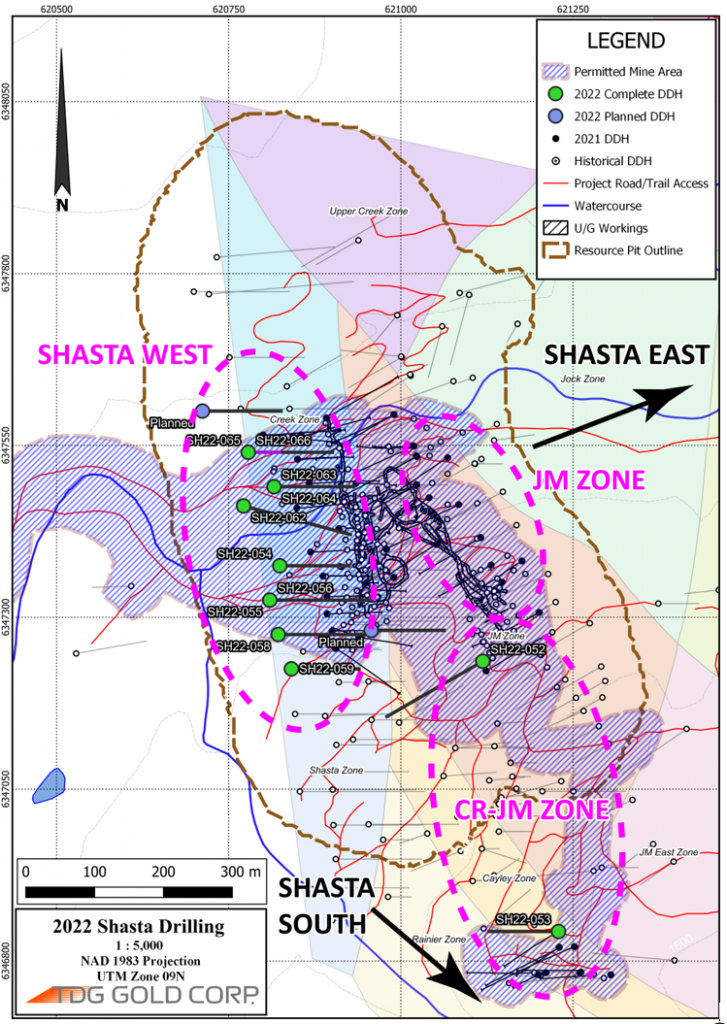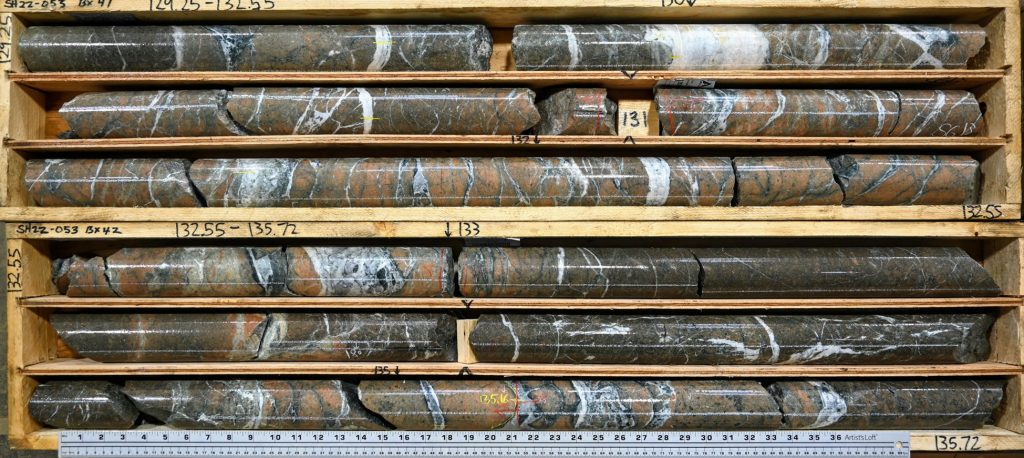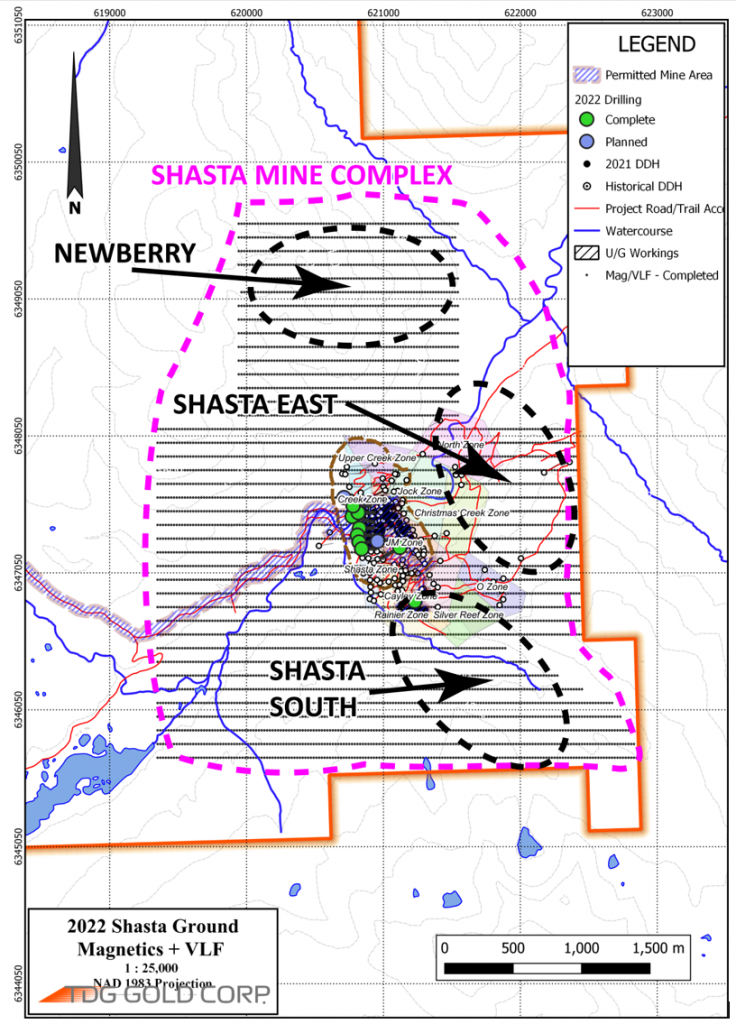TDG GOLD CORP. PROVIDES SHASTA EXPLORATION PROGRESS UPDATE
White Rock, British Columbia, September 13, 2022 – TDG Gold Corp – (TSXV: TDG) (the “Company” or “TDG”) is pleased to provide a comprehensive update on exploration progress (including drill core images) from diamond drilling underway at its mineral resource stage, former producing gold-silver (“Au-Ag”) Shasta project located in the Toodoggone Production Corridor of north-central B.C. This current news release should be read in conjunction with TDG’s previous Shasta news releases of June 21, 2022 (link) and July 11, 2022 (link), which provided an overview of the priority targets at Shasta and the proposed drill program to test them.
All commentary on exploration progress contained within this news release is subject to assay results which are still pending and therefore should be read and interpreted with appropriate caution.
Highlights within this news release include:
• 3,494 metres (“m”) of oriented HQ diamond drilling completed at Shasta as of September 08, 2022, in 15 drillholes. Core from 10 drillholes have been submitted to an ISO/EIC certified laboratory (ALS Laboratories Group, Kamloops) for precious metal and multi-element assay, with preliminary results expected by mid-late October.
• Two structural drillholes completed between the JM and Cayley-Rainier zones with further drillholes to be planned subject to preliminary results.
• All work underway remains on time and budget with Stage One drilling (4,000-4,500 m) of the current program at Shasta expected to be completed by end-September to mid-October. Stage Two drilling (1,500-2,500 m) is fully funded and will be subject to exploration progress at TDG’s other projects, weather, preliminary results and wider market conditions.
• Geophysics, soil sampling and mapping work completed at other Shasta targets located within the broader “Shasta Mine Complex” (see TDG news release June 13, 2022 – link). This has included over 100 line kilometres (“km”) of ground magnetic and Very Low Frequency (“VLF”) surveys completed across Shasta, Shasta South and the Newberry target located approximately 1,500 metres to the north of Shasta. Initial results are expected by end-September.
Steven Kramar, TDG’s Vice President, Exploration commented: “We’re pleased with our exploration progress at Shasta to date particularly our ability to add real time data and information from the oriented core. Our updated geological model has suggested to us that the most direct route to resource growth at Shasta is through drilling the extension potential down dip at Shasta west and below the JM zone (see Figure 1 below) – so that has been the focus of our 3,494 m drilled so far.
Meanwhile, we’re also very excited to start getting the results from the broader work being led by Chris Dail to help us understand the bigger opportunity at Shasta – what we’re calling the ‘Shasta Mine Complex’ – and which includes, i) outcropping south of Cayley-Rainier which stretches at surface for an estimated 1,000 m, ii) to the east of the known mineralization at Shasta where soil geochemistry and indicates a gold in soil anomaly coincident with a large NE-SW structural trend, iii) the Newberry target located 1,500 m north of Shasta, hosting a gold in soil anomaly and a structural element that may be a continuation from Shasta. Our 2022 high resolution ground magnetics and VLF survey was designed to provide blanket coverage of Shasta Mine Complex to supplement geological and geochemical data for 2023 drill targeting.”

Shasta West
3,069 m completed in 15 drillholes of 16 drillholes planned. The concept of the Shasta West drilling was to test the down dip of the Shasta Fault structure, and the potential of continuation of mineralization at depth. The method could complete two objectives: i) to reclassify material adjacent to 2021 drilling from inferred to indicated category and, ii) encounter more mineralized material in an area left untested. Drilling to date encountered expected mineralization consisting of appreciable pyrite/acanthite in volcaniclastic rocks with quartz/carbonate veining or complete hydrothermal brecciation, with potassic/silicic alteration. Depths of encountered mineralization and to the intersection of the Shasta Fault were predicted by the updated geological model.
As examples, SH22-057 & 058 presents the opportunity for the down dip potential of the Shasta Fault (Figure 2). Drillholes 057 & 058 encountered appreciable disseminated pyrite and acanthite, silicification and K-feldspar alteration below the Shasta Fault, with increasing alteration, mineralization, and quartz-sulphide- veins hosting acanthite/native silver. These geological observations were also present in drillholes from the 2021 program, SH21-004/005. Images 1-4 present drill core from SH21-005, SH22-057 and SH22-058 to demonstrate similar geological observations described in 2021 drillcore that was assayed and 2022 drillcore that have assays pending.





JM Depth Extension
Currently 5 drillholes planned for a total of 1,337 m and scheduled to be drilled in late September. The JM drilling is planned with the same concept as the Shasta West target: step east, outside of the resource model and test the down dip extension of the JM structure, beneath the mine workings, at depth. This presents an opportunity to potentially increase the resource size and gold grade in an area of historically low drilling density and consequently, assay density. These planned holes are designed to test step outs (approximately 50 m) from holes such as SH21-043 &SH21-045/045B (see TDG news release April 26, 2022 – link).
JM Zone to Cayley-Rainier
425 m completed in 2 drillholes designed to collect additional structural information to investigate the orientation of veins/vein sets that might trend from the Cayley-Rainier zone in the South, toward the JM Zone in the North, beyond the historical mine workings. This area has a historically low assay density and may represent an opportunity to expand the resource, as the current resource (see TDG news release May 17, 2022, for MRE Pit Boundary – link) does not include mineralized material from the Cayley Rainier zone. Finalization of the proposed additional drillholes in this zone will be subject to review of the preliminary results, which are expected in by end-September to mid-October.
Drillhole SH22-053 encountered intervals strongly silicified, K-altered crystal tuff with high density of quartz/carbonate veining and disseminated sulphides, at shallow depths. This intersection was subsequent to a high degree of fracturing/faulting at the top of the hole. The veining at high angle to core axis, suggests an appropriate drill direction, and additional drilling to the north, will be assay dependent.


Proposed Shasta Additional Drillholes
Review of the 2021 oriented core has indicated the potential for laddering of veins between the two principal structural controlling features of the main mineralized zones of Shasta (Figure 1-the Shasta Fault and the JM brecciated body). TDG is considering drilling two holes between the Shasta Creek and JM Zones to test this theory. This will be subject to exploration progress at TDG’s other projects, weather, preliminary results and wider market conditions.
Shasta Mine Complex Ground Magnetics / VLF
TDG completed approximately 100 line-kilometres of high resolution ground based magnetics and VLF surveying around Shasta and the greater Shasta Complex. The magnetic data provides full coverage of the Shasta Complex to supplement an already robust dataset, and VLF is a technique with known success of identification of narrow vein structures. The survey is complete, and the geophysical contractor (Aurora Geosciences, Whitehorse, YT) is processing the data for final delivery and interpretation.

Qualified Person
The technical content of this news release has been reviewed and approved by Steven Kramar, MSc., P.Geo., a qualified person as defined by National Instrument 43-101.
This news release includes historical information that has been reviewed by the Company’s geological team and qualified person. The Company’s review of the historical records and information reasonably substantiate the validity of the information presented in this news release; however, the Company cannot directly verify the accuracy of the historical data, including the procedures used for sample collection and analysis. There is insufficient exploration on these prospects to define a mineral resource. It is uncertain if after additional exploration a mineral resource will be delineated. Therefore, the Company encourages investors to exercise appropriate caution when evaluating these results.
About TDG Gold Corp.
TDG is a major mineral claim holder in the historical Toodoggone Production Corridor of north-central British Columbia, Canada, with over 23,000 hectares of brownfield and greenfield exploration opportunities under direct ownership or earn-in agreement. TDG’s flagship projects are the former producing, high grade gold-silver Shasta, Baker and Mets mines, which are all road accessible, produced intermittently between 1981-2012, and have over 65,000 m of historical drilling. In 2021, TDG advanced the projects through compilation of historical data, new geological mapping, geochemical and geophysical surveys, and, for Shasta, drill testing of the known mineralization occurrences and their extensions. In May 2022, TDG published an initial NI 43-101 Mineral Resource Estimate for Shasta. For the 2022 field season, TDG will prioritize drilling the known mineralization at Shasta which extends south for ~500 metres from the historical JM Pit. TDG currently has 96,343,142 common shares issued and outstanding.
ON BEHALF OF THE BOARD
Fletcher Morgan
Chief Executive Officer
For further information contact:
TDG Gold Corp.,
Telephone: +1.604.536.2711
Email: info@tdggold.com
Neither TSX Venture Exchange nor its Regulation Services Provider (as that term is defined in the policies of the TSX Venture Exchange) accepts responsibility for the adequacy or accuracy of this release.
This news release contains forward-looking statements that are based on the Company’s current expectations and estimates. Forward-looking statements are frequently characterized by words such as “plan”, “expect”, “project”, “intend”, “believe”, “anticipate”, “estimate”, “suggest”, “indicate” and other similar words or statements that certain events or conditions “may” or “will” occur. Such forward-looking statements involve known and unknown risks, uncertainties and other factors that could cause actual events or results to differ materially from estimated or anticipated events or results implied or expressed in such forward-looking statements. Such factors include, among others: the actual results of current exploration activities; conclusions of economic evaluations; changes in project parameters as plans to continue to be refined; possible variations in ore grade or recovery rates; accidents, labour disputes and other risks of the mining industry; delays in obtaining governmental approvals or financing; and fluctuations in metal prices. There may be other factors that cause actions, events or results not to be as anticipated, estimated or intended. Any forward-looking statement speaks only as of the date on which it is made and, except as may be required by applicable securities laws, the Company disclaims any intent or obligation to update any forward-looking statement, whether as a result of new information, future events or results or otherwise. Forward-looking statements are not guarantees of future performance and accordingly undue reliance should not be put on such statements due to the inherent uncertainty therein.